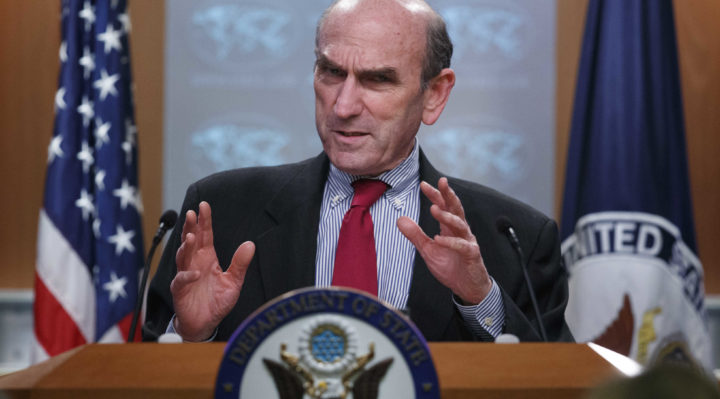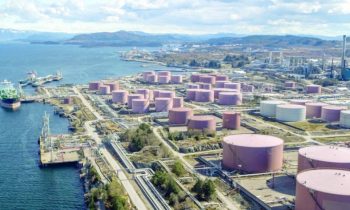US officials accused the Rosneft subsidiary of propping up the Venezuelan oil sector and engaging in “tricks” and ship-to-ship transfers to actively evade American sanctions.
“I think this is a very significant step and I think you will see companies all over the world in the oil sector now move away from dealing with Rosneft Trading,” Elliott Abrams, the US special representative for Venezuela, told reporters.
Treasury Secretary Steven Mnuchin added in a statement: “The United States is determined to prevent the looting of Venezuela’s oil assets by the corrupt Maduro regime.”
Rosneft called the sanctions an “outrage” and said that US authorities, in conversations with the company, had repeatedly recognised that it was not breaching any restrictions.

Below is a full rush transcript of the press conference by Elliott Abrams, U.S. Special Representative for Venezuela.
Mr. Abrams: Thank you. The first is to say that the Citgo 6, six Americans who were taken from house arrest 14 days ago by the regime’s intelligence service, the SEBIN, and sent back to its prison, remain in prison and they’re not being permitted to speak to their families or their lawyers. This cruel and indefensible imprisonment must end, and we condemn their unjust treatment. They should be permitted to leave Venezuela and return to their families. I would repeat also our condemnation of the holding of well over 350 political prisoners by the Maduro regime, including members of the National Assembly, deputies Juan Requesens, Gilber Caro, and Ismael Leon, and Juan Guaido’s chief of staff, Roberto Marrero.
Second, we’re pleased that Interim President and National Assembly President Juan Guaido returned home to Caracas safely last week despite regime efforts to attack him and those who greeted him at the airport. Regime thugs dressed as airline employees attacked Guaido and those around him but happily he escaped without injury. The French, Portuguese, EU and other ambassadors were there to greet Guaido and try to keep him safe, and we congratulate them for this action. The security forces at the airport supposedly there to maintain order did nothing. Guaido’s uncle, who traveled with him, was seized at the airport by the regime’s police. He is being charged with terrorism for carrying explosives on the plane that carried Guaido and his party from Lisbon, a charge that’s been completely denied by the airline, TAP, and by the president and foreign minister of Portugal. Like the jailing of Guaido’s chief of staff Roberto Marrero, this is an obvious and vicious effort to attack Guaido’s closest advisors and his family.
Now, yesterday the United States sanctioned Rosneft Trading S.A. and its chairman and president, Didier Casimiro. Treasury Secretary Steven Mnuchin said, quote, “Rosneft Trading S.A. brokered global oil deals involving the sale and transport of Venezuelan crude to provide a lifeline to the illegitimate Maduro regime,” close quote. Rosneft Trading S.A. is a subsidiary of the Russian global energy giant Rosneft Oil Company that was created in 2011 to assist Rosneft Oil Company in carrying out its foreign projects. Rosneft Oil Company, the parent company, was previously sanctioned in 2014. All property and interests in property of Rosneft Trading S.A. and Didier Casimiro that are in the United States or in the possession or control of U.S. persons are blocked and must be reported to the Office of Foreign Assets Control at Treasury.
As you will recall, almost two weeks ago the United States sanctioned Conviasa, the Venezuelan state-owned airline. Yesterday’s sanctions are another step in the policy of pressuring the Maduro regime to allow Venezuela to escape from its terrible crisis through free and fair presidential elections. There will be more steps and further pressure in the coming weeks and months. The United States remains firmly committed to the people of Venezuela and to the cause of freedom there, and as we saw when President Guaido received an ovation during the State of the Union message, this cause has bipartisan support in the United States. We look forward to the day when Venezuela is free and all our sanctions can be lifted. Until that day comes, the pressure will continue and it will build steadily.
Question: How vulnerable is Rosneft to punitive U.S. actions if they chose to ignore – if they choose to ignore the sanctions?”
Mr. Abrams: The sanctions on Rosneft Oil Company, the parent, date to 2014. What happened yesterday was sanctions on Rosneft Trading S.A., a company organized in Switzerland. I think they are quite vulnerable. As I talk to people in the oil industry, I find them saying that complying with sanctions is complicated. You end up having to turn to the lawyers all the time. So there are a lot of companies – insurance companies, shipping companies, trading companies – that simply say when a company is sanctioned we stop dealing with it, period, because we don’t want to come into any sanctions problems.
So I think that Rosneft Trading is actually quite vulnerable, and I think a number of the companies that it trades with, sells oil to, for example, will no longer wish to deal with it.
Question: Ambassador Abrams, you said yesterday and the Treasury Department gave a list of how many barrels, millions, have been sent to West Africa, and we’ve read reports about barrels from PDVSA ending up in China and India – these kinds of news reports. I wanted to ask you, what can happen, if anything, after this 90-day period to those companies in West Africa, in India, in China that end up buying this oil, even if they don’t know – they do not know that it’s oil coming from Venezuela?
And the second question that I would like you to address is, are you considering other sanctions that can hit the gold industry? We’ve read a lot of reports about how gold is getting out of Venezuela and how it’s being extracted under very hard circumstances.
Mr. Abrams: First, the sanctions of course are on Rosneft Trading. If what you might call an innocent bystander purchases Venezuelan oil not knowing where it’s from, does not deal with Rosneft Trading at all, that might not be a sanctions violation. But it is our intention to speak with the major consumers of Venezuelan oil – and the major consumers are in Asia – about reducing their consumption of Venezuelan oil. And of course, what we did yesterday was a specific action, but it was also a signal that, as I said just now, more is coming. So we are urging people who are consumers, we will be urging people who are consumers of Venezuelan oil to look elsewhere, and I think that any prudent company would start turning away from Venezuelan oil as it seeks to think about oil supplies for the rest of 2020.
We’re very concerned about the question of gold for a number of reasons. I would start with the ecological question. I think there’s plenty of evidence that the way gold is being mined in Venezuela, mostly illicitly, is having a terrible ecological effect on the areas in which the gold mining takes place, and having a terrible effect on the people who live in those areas, many of whom belong to indigenous groups and are simply being pushed aside or treated even worse than that. This is an illegal trade in the sense that what we see happening is the regime awarding areas, awarding gold mining areas to regime leaders or to generals and saying, okay, that one is yours. It’s a way of buying loyalty to the regime. And they in essence destroy these areas in an effort to get the most gold out as quickly as possible.
This is something that we have discussed at the United Nations last September and October, which we will be discussing at meetings in Europe in the next month. So it is very much on our mind, and I think we will be paying more and more attention to this over the coming months.
Question: You’ve had a long career in government service and been involved with a lot of contexts and countries, and I wondered if you saw any parallels between the situation the U.S. finds itself in vis-à-vis Venezuela with Central America during the 1980s or Iraq before 2003?
Mr. Abrams: Well, there’s one parallel certainly to a lot of Latin America in past years, and that is that they – Venezuela is a dictatorship, and you have a regime that is trying to prevent the return of democracy and that stole an election in 2018. Over the decades, that kind of thing has happened in the majority of countries in Latin America. Happily, most have emerged into democratic systems.
So I would say that is the – that’s the main link, the struggle for democracy and the struggle to have a hemisphere of democracy without any countries that are an exception.
Question: What would be the U.S. strategy regarding Venezuela? Yesterday you announced that you will treat Chinese state media as foreign missions. So in that case, what will happen with Telesur?
Mr. Abrams: I don’t have any announcements to make with respect to Telesur, but we are looking very carefully at it because we have had many reports that Telesur is not actually a news source, it is more of – it is analogous to the Chinese news – well, allegedly, news sources against which the United States acted yesterday – that is, that it tends to reflect only the views of a government rather than actually being an independent news source. So we are – we are taking a careful look at Telesur.
Question: Will OFAC release PDVSA resources that are in frozen accounts to support operations of an interim government of Juan Guaido?
Mr. Abrams: Generally speaking, the issue relating to frozen accounts is that Venezuela is a country with an enormous debt, and the company, PDVSA, the state oil company, also has enormous debts. When frozen accounts are unfrozen, what I think will happen is that the creditors will immediately try to jump on those accounts to get their money back. And in a number of cases, creditors have already gone to court in the United States and they have already gotten court judgments that yes, they are owed this money, but they can’t be repaid because all the money is frozen. So if the money were unfrozen, it is not at all clear that it would go to the interim government rather than being seized or refrozen to benefit commercial creditors.
Question: You are aware that Venezuela has filed a case against the U.S. in the International Criminal Court a couple of days ago, I think. I wanted to get your reaction to that and I also wanted to ask you if you have anything to say regarding Venezuela’s intention to add a complaint connected to the sanctions against the Rosneft Trading to this – to this case in the ICC.
Mr. Abrams: I think it’s absurd. The – a number of Latin American countries have brought the Maduro regime before the International Criminal Court. So the regime reacts by saying that economic sanctions on the part of the United States are, I don’t know what, some kind of crime. And the regime’s foreign minister actually said that again yesterday.
It is absurd, so we pay no attention to it. And adding to the International Criminal Court sanctions against Rosneft Trading is equally ridiculous. So I think it’s a foolish gesture on the part of the regime.
Question: What do you expect from Russia’s government from now on? These U.S. sanctions aren’t permanent, an intent to change behaviour. Do you think Russia is willing to participate in a transition in Venezuela?
Mr. Abrams: Well, I hope the answer to your question is or might be positive – that is, it would help a lot if, either publicly or privately, the Russian Government, which is a critically important supporter of the Maduro regime, would say to the regime, look, the country is being badly, badly damaged. It’s time to have a presidential election and look for a way out of this crisis. That is certainly not what the Government of Russia is saying publicly. And yesterday in reaction to the sanctions against Rosneft, there was a statement to the effect that the sanctions would not affect Russian-Venezuelan relations.
You’re exactly right in saying that the purpose of sanctions is to change behavior. They are never meant to be permanent. And in this case, the goal is to force the Maduro regime into a negotiation for a presidential election because a presidential election is the best way out. It is a peaceful way out of the current crisis.
So we would hope that the Government of the Russian Federation would give that advice to the Maduro regime. We haven’t seen that yet, but that would be a very positive contribution.
Question: What is the U.S. position towards Spain when it comes to Venezuela after the latest developments?
Mr. Abrams: First, Spain, as a democracy and as a member of the EU, recognizes the terrible crisis in Venezuela and the fact that Venezuela is not a democracy, and has recently referred again to Juan Guaido as the interim president and leader of the opposition, president of the National Assembly. So I would say the position of the United States and the position of every EU member country and the EU itself is really basically the same. That doesn’t change because of the sanctions on Rosneft. We have a regular dialogue with the Government of Spain on, as you can imagine, on dozens and dozens of issues. One of them is Venezuela where Spain has been very concerned in part because there are a lot of Spanish citizens living in Venezuela. So we continue to talk to Spain about Venezuela. I guess I’d leave it at that.
Question: What will be the future of Chevron in Venezuela?
Mr. Abrams: We never talk about future activities like that. We never announce future sanctions. But we will be talking now in the aftermath of the sanctions on Rosneft to all the affected parties. That includes joint-venture partners. That includes American companies, European companies that are active in Venezuela. That includes customers of Rosneft Trading. So we’ll have a conversation with Chevron as one of the many affected companies. But that will be a private conversation. And as to what is coming down the road in February and March and April and May, we’ll announce those things when we get to them.
Mr. Abrams: I would say two things. First, a general question, of course, is why sanction anybody. What is the purpose of sanctions? And it’s worth repeating again: sanctions are easily reversible. They are meant to be temporary. In this case, the goal of sanctions is to force the regime in Caracas into doing something that it has not yet wanted to do, which is to negotiate a new, fair and free presidential election that would allow Venezuela to emerge from its current crisis.
The second thing I wanted to end with was just to say that what happened yesterday was one step. There will be other steps. There will be other targets. There will be more sanctions. The pressure will not cease until Venezuela once again is able to recover its democracy. And it is noteworthy – I think many of you will have seen Interim President Guaido at the State of the Union speech. And many Venezuelans have commented to me that what struck them was that all of the senators and representatives rose to applaud.
The cause of democracy in Venezuela really does remain, even in a politically divided Washington, a completely bipartisan cause, which is good news, I think, for the cause of democracy in Venezuela and for all Venezuelans. Thank you.



